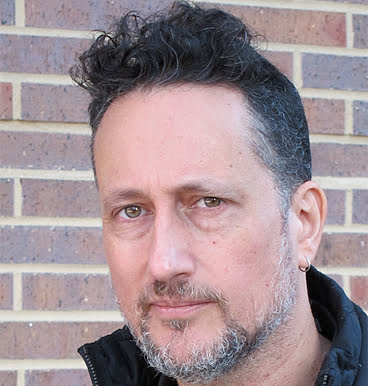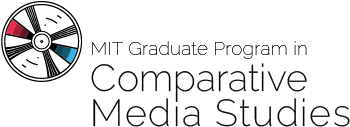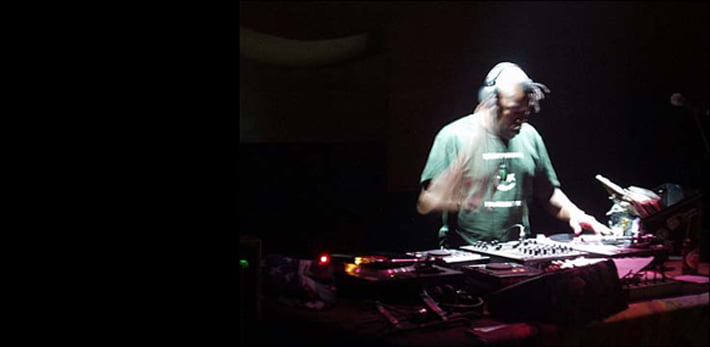From dub music to South Asian Diasporas, to political theory and a Ph.D. in American Studies, and onto digital media – the colorful professional trajectory of Vivek Bald has led him from his former base in New York to MIT’s Comparative Media Studies program.
Bald was invited last fall to join the faculty of the MIT Program in Writing and Humanistic Studies (PWHS), an affiliate of CMS, as part of the program’s expanding engagement with digital media arts and practices. The California-born documentary filmmaker has captured this panoply of life-long interests on digital video to best cement their socio-political messages.
Over the coming years, he will be devoting his time and talents to an innovative web-based social history project that seeks to expand the traditional form of the social documentary, to embrace the interactive narrative techniques offered by the Internet.

“It is based on the idea of working with young people in a particular neighborhood to interview the elders in their area over an extended period of time and build a dense local history that would be accessible to the public on the web via a searchable database of video clips,” Bald said. “The idea is to see how the form of the social documentary might be expanded beyond the standard form of a 60-90 minute single-author narrative through localized, community-based production and the interactive possibilities of the web.” In Bald’s spring course, Communicating with Web-based Media, he and his students will be developing a prototype for this project.
“A lot of students might not know this, but alongside Creative Writing and Science Writing, PWHS now offers Digital Media as one of its core areas of study for undergraduate major,” Bald said.
As Assistant Professor of Digital Media, he is one of three recent arrivals in the program’s expanded territory in the digital arts, including Nick Montfort and Beth Coleman, in an effort spearheaded by PWHS Senior Lecturer Edward Barrett. While these professors each bring their own different skills and perspectives to the field, his contribution comes from his background in digital video production.
The project-based course focuses on the analysis, design, implementation, and testing of various forms of digital communication through group collaboration. Bald described what he envisioned for the course:
“We will be working collectively to create the prototype for a Digital Social History website – specifically, a searchable video database in which users can access and view segments of interviews with residents of a particular Boston neighborhood in which the residents relate the history of their community.”
Last semester, his experiences as an independent documentary filmmaker who has studied and filmed the social movements of the South Asian Diaspora, in which he himself has roots, were of immediate relevance to his class The Social Documentary: Analysis and Production. The course introduced the history of the social documentary from the 1960s through the 1980s and explored how socially engaged documentary film production emerged and soared as a genre following the social upheavals of the times and the adoption of more portable film cameras.
Despite being substantial in theory, the course offered plenty of practical, hands-on experience. After screening and analyzing key films from the period, students then worked in groups to produce their own short documentary using digital video and computer-based editing.
This is what Bald, who completed his Ph.D. in American Studies at NYU just before joining MIT, has done throughout his professional development: combining his academic knowledge with concrete projects, always keeping his camera handy and his eyes open for good ideas and sources for a social documentary. (He also holds a B.A. in politics received from U.C. Santa Cruz and an M.I.A. in International Media and Communications and South Asian Studies.) He set out to put on film what he had studied and observed and went on to produce two feature-length documentaries about distinct aspects of the South Asian Diaspora: Taxi-vala/Auto-biography, about South Asian immigrant taxi drivers in New York, and Mutiny: Asians Storm British Music, about South Asian youth, music, and politics in 1970s-90s Britain.
From these professional endeavors, the idea for further graduate study grew.
“At the time that I was finishing Mutiny,” he said, “I was just starting to conceptualize another documentary project with a friend of mine, the New York-based writer and performer Alaudin Ullah, about his father’s experience as one of the earliest Indian men to migrate and settle in New York, back in the 1920s. As I was beginning that project, I decided I wanted to pursue a Ph.D., both in order to deepen my practice as a documentary maker and teacher and as a means to explore, through more sustained scholarly research, the largely unknown history of early Indian migration to the U.S.”
This history, Bald said, is the subject of his dissertation.
“It centers primarily on men from East Bengal – the region which is now Bangladesh – who were working on British steamships in the late 19th and early 20th centuries, doing the heavy industrial labor of firing and stoking engine room furnaces, who jumped ship in U.S. ports like New York, New Orleans, Baltimore, and Philadelphia in search of better work onshore. After exploring this larger history, from the 1890s-1940s, the dissertation focuses on one group of ex-maritime workers who settled in Harlem and intermarried within the Puerto Rican and African American communities there. The documentary film, which is tentatively titled In Search of Bengali Harlem, will also pick up from this point, delving into the story of Alaudin, his father, and his father’s family and extended circle of friends in Spanish Harlem.”
Bald’s interest in filmmaking rose from his deep belief in the power of films to act as vehicles for socio-political messages. The now-seasoned filmmaker recalls what spurred his first step in the business.
“When I decided to start making films myself, it grew out of a moment in my early 20s, when I was heading straight into a Ph.D program to study more political theory.” But Bald wanted engagement with social and political issues in a more popular medium. “So I changed course and found an internship at a PBS TV station. There, I was able to do research for a documentary on police brutality and even though I didn’t get my hands on any production equipment at that point, the experience really got me hooked.”
He then thought about going to India, where one side of his family is from, to pursue journalistic and/or documentary work. With that goal in mind, he had moved to New York to do a two-year Master’s degree at Columbia University’s School of International and Public Affairs.
“But once I got to New York,” he said, “I realized that I had a much stronger connection to the South Asian immigrant and second-generation communities there, and was much more interested in exploring the stories and histories of the Diaspora. So my documentary film work over the last eighteen years has stemmed from this.”
Bald’s interest in music stems from similar motives: it is the message behind the melody that matters, and experiencing music through the prism of political engagement has culminated in his music and social documentary Mutiny: Asians Storm British Music, shot over the course of seven years. The film charts the influential rise of Asian music in 1990s Britain, as well as the years of cultural cross-pollination and political struggles that helped create that landmark in the history of music.
The film, which features interviews, performances, and archival footage of British musicians of South Asian descent, tells the story of a generation that grew up in the 1970s and 80s, defining itself in an environment of racial violence while drawing strength from both British street culture and its South Asian roots. The artists who emerged from this generation went on to become some of the greatest innovators in British music, mixing the influences of their parents’ cultures with electronic and dub music, hip-hop, reggae, and punk.
Bald, a musician himself, explained where the ideas for Mutiny all began.
“I got involved in music from my early teens onward, both studying the sitar during extended periods living with my relatives in India and playing drums in punk and post-punk bands in Central California, where I was growing up. I was also deeply into 1970s reggae and started going to reggae shows – seeing everyone from Steel Pulse to Burning Spear, Lee Perry, Gregory Isaacs, Dennis Brown, and others, from the time I was fourteen, and then got into the Two-Tone ska revival and early hip-hop in the early 1980s.
“That period from the mid-1970s to the early 1980s was an amazing time, in terms of all the things that were going on musically. But what I connected to in all those scenes was both the music and the politics – the fact that they were intertwined, that in all those cases music was a form of social and political expression.
“So, years later, when I started finding out about a whole range of different bands and musicians in Britain who, like me, were of South Asian descent and who were bringing together elements of punk, reggae, hip-hop and electronica with South Asian folk, classical, and film music, and in many cases were engaged in anti-racist and other activism, I wanted to document what was going on. So I started making trips over to Britain in 1996 and shooting performances and interviews with members of groups like Asian Dub Foundation, Fun^Da^Mental, Joi, Voodoo Queens, Kaliphz, Hustlers HC, and Black Star Liner and with individual musician/producers like Talvin Singh, State of Bengal, and DJ Ritu. That became the basis for Mutiny: Asians Storm British Music, which was completed in 2003,” he said of the film, which was screened for the CMS students and faculty.
One of the things he didn’t realize until he started filming was just how deeply young people of Pakistani, Bangladeshi, and Indian descent were involved in the earliest days of British hip-hop, back in the early to mid 1980s – as rappers, DJs, b-boys, graffiti artists, running mobile sound systems. According to him, this is a history that is still not very well known.
He came out of the experience of making the film with a much more expansive understanding of the connections between music and politics, which is something he plans to explore in one of the courses he is teaching this semester, called “Film, Music, and Social Change.”
The spring course, which examines films from the 1950s onward that document music subcultures and moments of social upheaval, combines screenings of films about free jazz, glam rock, punk, reggae, and hip-hop with a close study of critical/scholarly writings to illuminate the connections between film, popular music, and processes of social change. Students learn to critique each film in terms of the social, political, and cultural world it documents, as well as the historical context and effects of the film’s reception.
Bald’s future at MIT may hold more music.
“I’ll be joining Global Frequency, a radio show devoted to electronic music from various parts of the globe, on WMBR this semester, which will reunite me with DJ Singe and MC Verb, whose Soundlab/Abstrakt crew I was part of in NYC back in the mid-1990s,” he said.
That future doesn’t feature grand, long-term plans. For now, the filmmakers’ attention is too busy examining his immediate CMS surroundings, and he likes what he sees – opportunities to be both an academic and a practicing professional in the field of digital media, to which he is devoting all his creative energies while at MIT.
His professional landscape has not always looked so clear and promising, both academically and with regards to the practical aspects of the filmmaking trade.
When he took the decision to study for a Ph.D. with a view to continue working as a filmmaker, he had hesitations as to whether he would be able to combine his passion for film with academic research. There are very few jobs in the academic world where someone can do both scholarly research/teaching and film production work. Usually it has to be one or the other, he said.
Bald said he feels lucky to have found a department and a university that were looking for someone to do both these things.
“I’m happy to be here in PWHS, and teaching courses cross-listed with Comparative Media Studies,” he said of the program which proved to be the perfect interface for his dub, diasporas, and digital interests to converge successfully and creatively.




